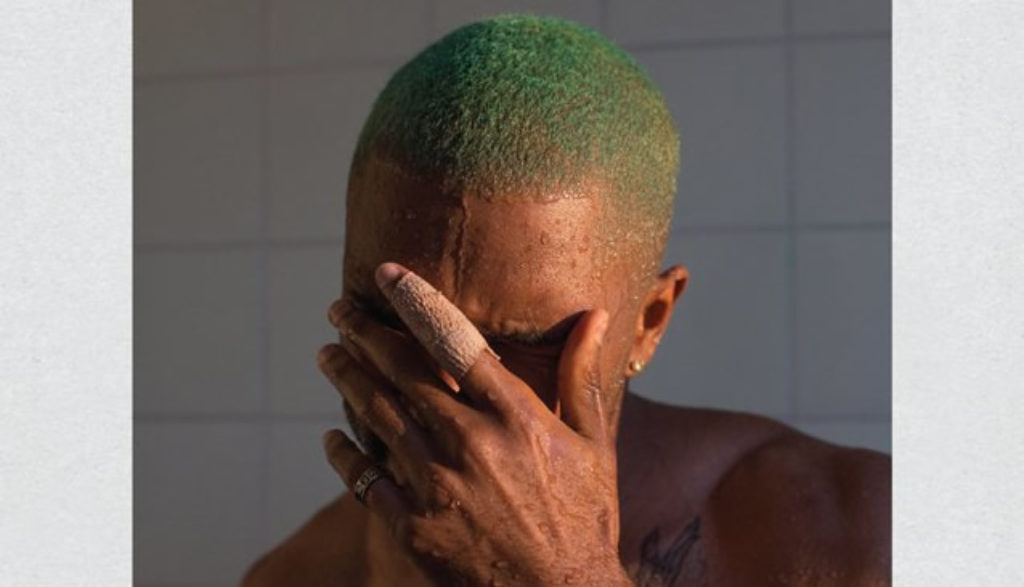
If Radiohead, Drake, the Beach Boys and Prince—and maybe novelist William Faulker, too—teamed up to make an experimental, stream-of-consciousness, pop-rap-R&B-alt-electronica album, I’ll bet it would sound a lot like Frank Ocean’s critically heralded Blonde.
The singer’s second studio effort defies easy categorization. Accordingly, reviewers are raiding the thesaurus to appropriate off-the-beaten-path adjectives to articulate what Ocean’s beautiful, mesmerizing, disorienting blend of sonic influences sounds like. Words such as feverish, avant-garde, post-millennial are among those being lobbed around. Rolling Stone’s Jonah Weiner calls Blonde “a dizzy, trippy, druggy marvel.”
It’s all those things, glorying in genre-blurring ambiguity.
That ambiguity shows up in the album’s lyrics as well, many of which impressionistically get at the messiness of broken relationships. Ocean came out as gay immediately before releasing his debut, Orange Channel, in 2012. On this album, however, there’s only one clear reference to going on a date with another man. Elsewhere, it’s unclear exactly whether he’s singing about men or women on the album’s 16 other tracks. (Some have also speculated that the reason why the album is officially called Blonde but spelled Blond on its cover is a subtle reference to Ocean’s reported bisexuality.)
What is clear is Ocean’s yearning [for?] wholeness, an experience that proves as elusive for him as his hedonistic exploits are abundant.
The most positive content on the album is likely intended ironically. That’s because even though Ocean sings openly about using drugs on several songs, the track “Be Yourself” is what sounds like a voice mail message from someone’s fictional mother (reportedly not Frank’s) railing against peer pressure and drug use. She tells her son, “Many college students have gone to college and gotten hooked on drugs, marijuana and alcohol. Listen, stop trying to be somebody else. Don’t try to be someone else. Be yourself. … Be secure with yourself. … You understand the things that I’ve taught you. Not to drink alcohol, not to use drugs. Don’t use that cocaine or marijuana because that stuff is highly addictive. When people become weed heads, they become sluggish, lazy, stupid and unconcerned.”
On “Ivy,” a childhood friendship morphs into love (“I thought I was dreaming/When you said you loved me”). Elsewhere in that song, Ocean laments the loss of childhood’s innocence: “We’ll never be those kids again.” Similar stuff turns up in “Pink + White,” which perhaps subtly describes love as a gift from God: “You showed me love/Glory from above.” On “White Ferrari,” we hear this promise: “I care for you still and I will forever/That was my part of the deal, honest.”
“Pretty Sweet” emphasizes mutual affection between parents for the sake of their children: “Mothers of us be kind/To the fathers on whom we rely/Fathers of us be kind/To the mothers on whom we rely.” “Seigfried” finds the singer saying he’s “taking in the homeless sometimes”. On “Godspeed,” Ocean wishes a departed friend or relative peace on the other side (“The table is prepared for you/Wishing you Godspeed, glory/ … I’ll always love you”). Album closer “Futura Free” recognizes, “I’m just a guy, I’m not a god,” even though some fans treat Ocean almost like a deity.
On “Futura Free,” Frank profanely describes his ideal day: “I’d say as long as I could f— three times a day and not skip a meal, I’m good.” And “Skyline To” practically dares God to judge his immorality (“Making sweet love, takin’ time/’Till God strikes us”). Elsewhere in that song, he brags, “We smell of Californication.” F-words (as well as other vulgarities) flow freely throughout, as do regular slang references to both the male and female anatomy.
“Good Guy” relates failing to connect with another guy on a blind date. “Here’s to the gay bar you took me to/It’s when I realized you talk too much, more than I do.”
“Pink + White” longs for an everlasting high (“Running out the … nicotine/Stealing granny cigs/Gimme something sweet/B–ch, I might like immortality/This is life, life immortality.” “Solo” perhaps blends masturbation and LSD, later adding in oral sex and marijuana. The song’s chorus says, “It’s hell on Earth, and the city’s on fire/Inhale, in hell there’s heaven.” “Nights” tells someone, “Shut the f— up, I don’t want your conversation/Rolling marijuana, that’s a cheap vacation.”
“Pretty Sweet” seems to reject the idea of living chastely now for a heavenly reward in the future, even appropriating the elements of the Lord’s Supper hedonistically along the way: “All the risk, I’ll take it/Headbang with my four friends/We pour out a taste for the dead/This is the blood, the body, the life right now/ … F— the other side/I’m on this side.” Elsewhere, “Nights” references a séance, while “Close to You” wonders, “Why am I preaching/To this choir, to this atheist?”
In some significant ways, Blonde is not a typical rap or R&B album at all. In other ways, it is. Sex of various kinds (including some very explicit narrations of oral sex) is often depicted, as is drug usage.
There’s plenty of honesty and authenticity here, two virtues very much in vogue today. Unfortunately, they’re not anchored to anything other than Frank Ocean’s experience—one that vacillates between his longing for permanent, faithful love one moment and the pursuit of never-ending pleasure on his own terms the next.
Rolling Stone’s Jason Lamphier summarized the album’s core theme this way: “Blonde is queer in the word’s truest sense: nonconforming, elusive, boundless. It celebrates the intangible, the strange. It doesn’t play by the rules.”
He’s right: It doesn’t.

After serving as an associate editor at NavPress’ Discipleship Journal and consulting editor for Current Thoughts and Trends, Adam now oversees the editing and publishing of Plugged In’s reviews as the site’s director. He and his wife, Jennifer, have three children. In their free time, the Holzes enjoy playing games, a variety of musical instruments, swimming and … watching movies.